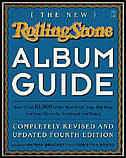| Working Drafts and Notes For: [The New] Rolling Stone Album Guide |
 |
Loudon Wainwright III
| Album III (Columbia, 1972) | |
| Attempted Moustache (1973; Columbia/Legacy, 1998) | |
| Unrequited (1975; Columbia/Legacy, 1998) | |
| A Live One (Rounder, 1979) | |
| Fame and Wealth (Rounder, 1983) | |
| I'm Alright (Rounder, 1984) | |
| More Love Songs (Rounder, 1986) | |
| Therapy (Silvertone, 1989) | |
| History (Charisma, 1992) | |
| Career Moves (Virgin, 1993) | |
| BBC Sessions (1971-93; Fuel 2000, 1998) | |
| Grown Man (Virgin, 1995) | |
| Little Ship (Charisma, 1998) | |
| Social Studies (Hannibal, 1999) | |
| Last Man on Earth (Red House, 2001) | |
| So Damn Happy (Sanctuary, 2003) |
Loudon Wainwright III grew up rich and whiny in Beverly Hills and the suburbs of Westchester County. He went to prep school, studied acting (and has done a little), wrote some songs. He was touted as a new Dylan, signed by Atlantic, and cut two out-of-print albums there. His next record, Album III, spawned a top-20 hit single, "Dead Skunk" -- he claimed to have written that one in 15 minutes, but it took him years to convince the major labels that he'd never write another one. But when he wasn't boorish ("Clockwork Charteuse") or pathetic ("Red Guitar," "The Man Who Couldn't Cry"), he could be quite funny: "B Side" deals with the sex life of bees; "Swimming Song" extols the virtues of going informal; "I Am the Way" catches Jesus kissing Magdalene (done with a laugh track for anyone who needed the hints); "Guru" mocks sham holiness ("they're proselytizing and it's mesmerizing and they're making moolah every day"); "Rufus Is a Tit Man" admires his infant son's culinary tastes; and "The Untitled" (introduced as "The Hardy Boys at the Y") revels in good clean sex. But the real theme of Unrequited was the turmoil and breakup of his marriage to Kate McGarrigle, from "Whatever Happened to Us" ("you told me that I came too soon/but it was you who came too late") to "On the Rocks" ("on Park Avenue South/I punched my baby on the mouth") to the post-separation but ultimately fruitless "Absence Makes the Heart Grow Fonder."
Wainwright's Rounder albums figured to be folky, but he moved to England and fell in with some real musicians -- Richard Thompson and unrelated bassist Danny Thompson are constants, and Tony Coe turns in some nice clarinet. A Live One looks backward, sometimes derisively. But Fame and Wealth has fond memories of country club swimming pools in "Westchester County"; I'm Alright declares that he's survived divorce; More Love Songs threatens to make a career out of it, in songs like "Unhappy Anniversary" and "Your Mother and I" ("are living apart/I know that sounds stupid/but we weren't very smart"); Therapy concerned itself more with parenthood, as in "Me and All the Other Mothers"; and in History he seems to come to some hard-learned realizations: that "Hitting You" just made things worse, that "my songs about you were all about me" ("So Many Songs"), and finally that "I'd Rather Be Lonely." As he grew older, Wainwright's skill shifted from comedy (although he could still sling out "Talking New Bob Dylan") to trenchant observation, not that it ever extends far beyond himself.
Career Moves is career-capping: a live album which work both as a best-of and as a showcase for his showtime comedy. The songs on The BBC Sessions are mostly familiar, recorded simply over two decades -- although "It's Love and I Hate It" is scabrous and shameless and ever so typical. Grown Man consolidates his gains -- for instance, his "Five Years Old" daughter has grown up into "Father/Daughter Dialogue": "dearest daddy with your songs/do you hope to right your wrongs?" In his part, dearest dad denies that the guy in his songs is him. If the songs on Little Ship seem less detailed, perhaps he's working on his deniability. The songs on Social Studies were mostly written as news commentaries for NPR and, I gather, mostly rejected: there's something to offend everyone, so caveat emptor. Last Man on Earth is an improvement, the death of his mother focusing his thoughts on his own mortality. But when he concludes that "I feel like I'm homeless," he's testifying that even the rich and whiny have to struggle to be alright.
Notes
Other albums:
| Album 1 (Atlantic, 1970) | |
| Album 2 (Atlantic, 1971) | |
| The Atlantic Recordings (1970-71; Rhino Handmade, 2000) | |
| T-Shirt (Arista, 1976) | |
| The Final Exam (Arista, 1978) | |
| One Man Guy (1982-86; Music Club, 1994) | |
| Jesse Don't Like It (1995, Hannibal) |